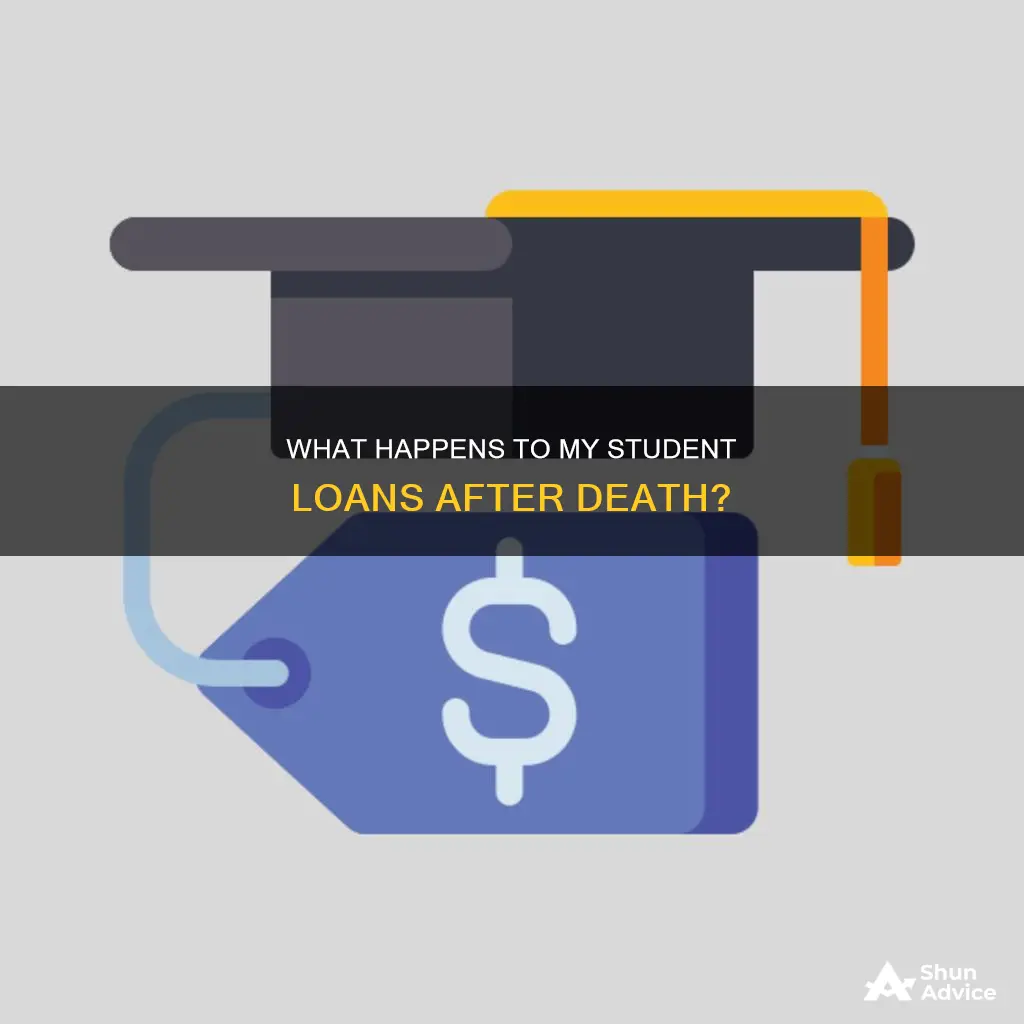
If you're wondering what happens to your student loans when you die, you're not alone. The answer depends on the type of loan you have. Federal student loans are generally discharged upon the borrower's death, but private student loans can be a different story. Some private lenders, like Sallie Mae, will discharge the loan after the borrower dies, but others may require the full balance to be paid by a co-signer or spouse. In the case of permanent disability, a Sallie Mae loan balance may also be waived.
| Characteristics | Values |
|---|---|
| Federal student loans | Discharged upon death |
| Private student loans | May become the responsibility of the co-signer or spouse |
| Private student loan death discharge | Possible with some lenders, including Sallie Mae |
| Automatic default | Possible if a co-signer passes away |
| Total balance payment | May be required immediately after a co-signer's death |
| Permanent disability | May result in a waived remaining balance for Sallie Mae student loans |
What You'll Learn

Federal student loans are discharged upon death
If you have a federal student loan, you don't need to worry about passing on the debt to your family or cosigners in the event of your death. Federal student loans are discharged upon the death of the borrower, meaning the loan balance will be wiped away.
Federal law from the Tax Cuts and Jobs Act mandates that private lenders must release cosigners if the primary borrower dies, as long as the loan was taken out after November 20, 2018. However, it's important to note that this only applies to cosigners, and private student loans may not always be discharged upon the death of the primary borrower. While many private lenders do discharge loans in the event of a borrower's death, it is not a requirement, and some lenders may not offer this option. As a result, it's crucial to carefully review the terms and conditions of any private student loan before signing.
In the case of Sallie Mae student loans, the company states that if a student dies or becomes permanently and totally disabled and unable to work, they may be eligible to have the remaining balance waived. This means that, while not guaranteed, there is a possibility that Sallie Mae will discharge the loan in the event of the borrower's death.
To ensure that your family or cosigners are protected from paying back your student loans in the event of your death, there are a few things you can do. Firstly, check the discharge policies of your loan to understand what happens in the event of your death. If your loan does not offer a discharge policy, you may want to consider refinancing with a lender that does. Additionally, you could look into getting suitable term life insurance to cover your student debt costs if your loan is not discharged after your death.
Budgeting for Loans: Strategies for Financial Success
You may want to see also

Private student loans may still be owed by a cosigner or spouse
The fate of your student loans after your death depends on the type of loan you have. If you have a federal student loan, your loan balance will be discharged. However, if you have a private student loan, your story may be different. While some private loan lenders, such as Sallie Mae, discharge the loan after the primary borrower dies, others may require the total balance to be paid immediately by a cosigner or spouse. This means that, even if you have been keeping up with monthly payments on your own, your cosigner or spouse may still be on the hook for the full amount of the loan upon your death.
Private student loans can be a significant financial burden, and it's important to understand the terms and conditions of your loan, including any clauses related to death or disability. While it may be uncomfortable to consider, planning for the unexpected can help protect your loved ones from financial hardship.
In the case of Sallie Mae private student loans, if the borrower dies or becomes permanently and totally disabled and unable to work, the loan may be eligible for a remaining balance waiver. This means that the loan would be discharged, and the debt would no longer be owed by the borrower's estate, cosigner, or spouse. This policy recognises the tragic circumstances that can arise and seeks to provide some financial relief during difficult times.
It is worth noting that, while some private lenders may discharge the loan upon the borrower's death, this is not a given. Lenders may have different policies, and it is crucial to review the specific terms of your loan agreement. Understanding these terms can help you make informed decisions and, if necessary, plan accordingly to ensure your loved ones are not burdened by your student loan debt.
If you are concerned about the financial implications of your private student loans in the event of your death, there are a few steps you can take. Firstly, carefully review your loan agreement and understand the lender's policy on death or disability. Secondly, consider adding a cosigner or spouse to your loan, as they may be able to take over payments or negotiate with the lender on your behalf. Finally, explore alternative repayment options, such as refinancing or consolidating your loans, to find a solution that provides peace of mind and financial security for you and your loved ones.
Mudra Loan Subsidy: What Borrowers Need to Know
You may want to see also

Private loans may be eligible for death discharge
If you have a federal student loan, you don't need to worry—your loan balance will be discharged upon your death. However, the same cannot be said for private student loans. In the case of private student loans, the responsibility for the remaining balance may fall on the cosigner, spouse, or the borrower's estate, depending on the state law and the lender's policy.
Many private lenders do write off student loans upon the borrower's death, but this is not a requirement for lenders, and some companies will only discharge a loan if the primary borrower dies. Therefore, it is essential to check the loan contract to understand the discharge policies. If your loan does not include a death discharge clause, you may consider refinancing to get a new loan that includes one.
If you have a Sallie Mae student loan, your loan may be eligible to have the remaining balance waived if you die or become permanently and totally disabled and unable to work. Lenders like Sallie Mae will also remove cosigners from the loan after payments have been made for at least 12 straight months.
To get a death discharge, a family member, spouse, or another person you appoint to handle your affairs must submit proof of death to your student loan servicer. This can be an original death certificate, a certified copy, or a copy of the death certificate.
Uninsured Loaner: What Does My Insurance Cover?
You may want to see also

Automatic default is possible if a cosigner dies
The death of a borrower or cosigner can have significant implications for outstanding student loans, and the outcome may depend on the loan type and the lender's specific policies. In the context of Sallie Mae loans, it's important to understand the potential consequences:
If a borrower with a Sallie Mae student loan passes away, their loan may be eligible for discharge. This means that the remaining balance could be waived or forgiven. This policy applies to both federal and private student loans offered by Sallie Mae. Federal student loans are typically discharged upon the borrower's death, while private student loans may vary in their treatment of this situation. However, Sallie Mae has been known to discharge private loans after the borrower's death, which is a positive development for borrowers and their families.
Now, let's focus on the scenario where a cosigner dies:
Automatic default is indeed a possibility when a cosigner on a student loan passes away. This means that the loan could immediately be considered in default, even if the primary borrower is still alive and capable of making payments. This situation can create financial strain and urgency for the primary borrower, as they may be required to repay the entire loan balance immediately. Lenders often have the right to demand full repayment upon the death of a cosigner, and this can be a challenging situation for those already grieving the loss of a loved one.
To avoid automatic default, it's crucial for borrowers to proactively manage their loans. One option is to remove the cosigner from the loan before their death. While this may increase the borrower's interest rate or affect their eligibility for the loan, it can prevent the loan from automatically defaulting if the cosigner passes away. Additionally, some lenders may allow a replacement cosigner to be added to the loan, providing an alternative solution to mitigate the risk of automatic default.
It's important to note that each lender and loan type may have unique policies and requirements regarding cosigner death. Borrowers should carefully review their loan agreements and consult with their lenders to understand their specific situation. Being proactive and informed can help borrowers navigate these challenging circumstances and make the best decisions for their financial well-being.
Interlibrary Loans: How to Access Books from Other Libraries
You may want to see also

Some private lenders require full repayment after a cosigner's death
When it comes to student loans and death, the outcome depends on the type of loan in question. Federal student loans are discharged upon the borrower's death, meaning the loan balance is wiped away. However, the situation is different for private student loans, which can vary depending on the lender. Some private lenders, such as Sallie Mae, will discharge the loan after the borrower dies. In this case, someone would need to send a copy of the death certificate to the lender, and the debt would be waived.
However, it's important to note that private student loans can be more complex. In some cases, if a cosigner or spouse was also on the loan, they may still be responsible for the debt. Additionally, some private lenders require the full repayment of the loan immediately after a cosigner's death, even if the primary borrower is still alive and has been making regular payments.
The requirements for discharging a private student loan can vary, and it's always important to review the specific terms and conditions of your loan agreement. In the case of a cosigner's death, it's crucial to understand the potential impact on the loan status. The loan may go into automatic default, or the lender may require immediate repayment in full.
To ensure a smooth process during a difficult time, it's recommended to be proactive. Communicating with the lender and understanding their specific requirements can help prepare for any eventuality. Additionally, keeping your loan information organized and accessible will make it easier for your loved ones to manage your financial affairs if needed.
While it's not a pleasant topic to consider, being informed about the potential outcomes of a cosigner's death can help protect your finances and those of your loved ones. It's always better to be prepared and understand your rights and responsibilities when it comes to loan repayment, even in unforeseen circumstances.
Multiple Buyers: Boon or Bane for Loans?
You may want to see also
Frequently asked questions
If you have a Sallie Mae student loan and you die, the remaining balance may be waived. However, if you have a private student loan, your cosigner or spouse may still be responsible for the debt.
If your cosigner dies, your loan could go into automatic default. Some private lenders require the total balance to be paid immediately after a cosigner passes away.
To update your name, date of birth, or Social Security number, send a copy of your driver's license or other relevant documentation to Sallie Mae.







